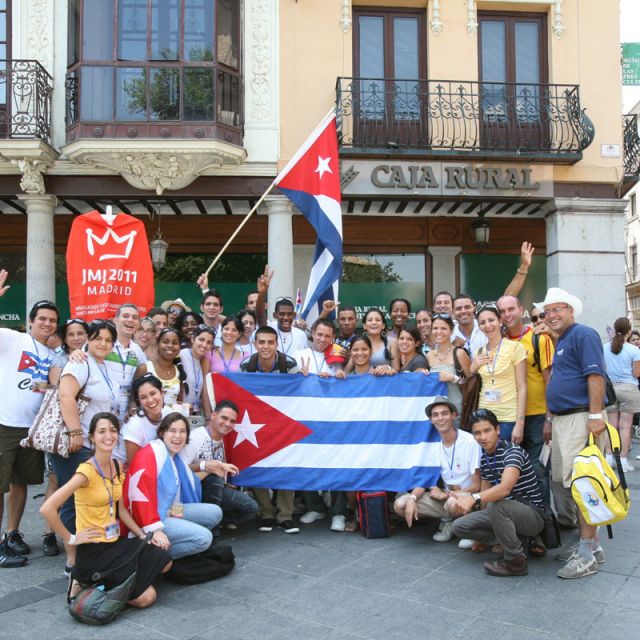Archbishop Wenski said the pope's visit to Cuba for the 400th anniversary of Our Lady of Charity of El Cobre -- the country's patroness -- is primarily as a messenger of peace and hope.
Over the past year, events around Cuba that are part of the anniversary celebration have reflected a resurgence of faith, said Archbishop Wenski. Huge crowds have turned out at every procession, Mass and prayer service for "La Mambisa," a touring replica of "La Caridad," as Our Lady of Charity is known to Cubans.
"Even the Cuban bishops have been surprised by the fervor with which the people have received the statue of Our Lady of Charity in their villages and towns," the archbishop said. "It really represents a new springtime of faith in Cuba."
In the early days of the revolution, the church suffered greatly, the archbishop said. Schools were dismantled; clergy were sent into exile. Open religious practice often led to discrimination in the workplace and for benefits such as housing.
In the 1980s, Cuban church leaders began aiming to be "a more evangelical presence," said Archbishop Wenski. That led to the conditions for Pope John Paul II to visit in 1998, which itself has led to more openings for the church's pastoral work.
"In recent years the relationship between the church and the government has improved," he said. "It's not all that people think it should be but it's better than what it used to be."
He said that means there's been "a genuine softening of attitudes that has everybody looking for a new 'modus vivendi,'" or agreement between those who disagree.
That's not to say the Cuban government has totally changed. The same day Archbishop Wenski spoke with CNS, the State Department issued a statement by spokeswoman Victoria Nuland decrying new reports of repression by the Cuban government, including against the "Damas de Blanco." Several members of the Ladies in White, a group of women who have for years held silent marches after church each Sunday in protest of their relatives' imprisonment, were arrested after Mass Dec. 4.
It said there are reports that more than 300 activists of various groups have been detained in recent weeks, some without charges or judicial review.
"At a time when citizens around the world are marking Human Rights Week, we call for an immediate end to the harassment and violence against Cuban citizens who are peaceful critics of the government," said Nuland's statement.
Archbishop Wenski said Cuba is "still a long way from being a normal country."
But he thinks participation in the papal visit and celebrations for La Caridad by Cuban expatriates or the diaspora, as he called it, should not be viewed as an endorsement of the Castro regime.
"I don't think you have to be afraid that the government is going to try to manipulate that," he said. "The people who travel there now do not do so to endorse the regime but to visit their family members. As a church community we are brothers and sisters and that's a reason to celebrate our unity in our Lady of Charity."
Since the Obama administration earlier this year relaxed parts of the 50-year-old trade embargo to allow Americans to visit their Cuban relatives as often as they wish, about 340,000 Cuban-Americans have traveled to their homeland, said Archbishop Wenski.
There are many critics among the immigrant community, particularly in Miami, of any travel to Cuba. The loosened restrictions were the target of efforts by Rep. Lincoln Diaz-Balart, R-Fla., to roll them back, with an amendment he attached to the House version of an omnibus spending bill being finalized Dec. 16. The amendment was removed in negotiations to craft a bill that could pass in the Senate.
"Some have expressed some opposition or hesitancy to the idea of going to Cuba to see the pope because of the longstanding political divisions between the exile community and the Cuban government," said Archbishop Wenski. "But this is not anything to do with the government. It is to go see the pope."
"The Cuban bishops have always said Cubans are one people, no matter where they are, so they are encouraging the Cuban diaspora to participate" in the pope's visit and in observing La Caridad's anniversary, he said.
"Once again the Blessed Mother, Our Lady of Charity, is opening the world of Cuba to hope and therefore to a future," the archbishop said.
"It's the bishops as pastors of the people who are inviting them to celebrate with Mary and find that unity in charity that she can give us," he said.
In fact, Archbishop Wenski said, "the Cuban government is right now between a rock and a hard place because of economic challenges that it has. Everybody knows there have to be some changes both in the economics and also in the politics."
"Whatever happens after the Castro regime disappears into the ash-heap of history, I think it's in everybody's best interests that there be a soft landing and that whatever transition comes does not come in the midst of chaos," said Archbishop Wenski.
The Cuban bishops are looking, as pastors, to be agents of reconciliation, he added.
"Nobody can predict how the politics of Cuba will evolve in the next months and years, but evolve they will. That we can be sure of. There's going to be a biological solution if not an electoral solution. Therefore the church's role is critical."


